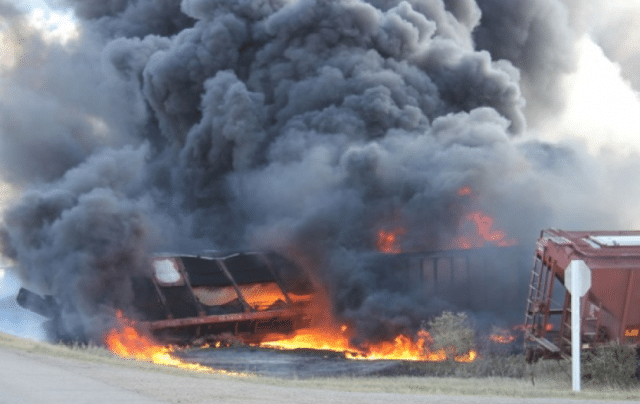A fiery CN train derailment in rural Saskatchewan has many people asking what could have happened if the accident occurred in a more populated area.
The 100-car freight train derailed Tuesday about 190 kilometres east of Saskatoon. Twenty-six cars left the track, including six carrying dangerous goods. Two cars containing petroleum distillate caught fire, sending 30-metre flames into the air. Several explosions were also confirmed.
The area around Clair, Sask., was evacuated overnight. Families were allowed to return to their homes Wednesday morning according to Harold Narfason, chief of the Wadena & District Fire Department.
The volunteer fire department was the first on the scene.
Narfason told DeSmog Canada his department has long been aware that dangerous commodities are being shipped by rail through the area.
“I’ve attended numerous meetings with CN to get informed and there are more cars moving through,” Narfason said.
On the scene of the derailment, his team quickly accessed the hazmat sheets, which indicated they were dealing with the explosive petroleum distillate.
“Everything is going as good as it can under the circumstances,” Narfason said.
The railway industry has been in the spotlight since July 2013 when 47 people died after an oil train derailed and exploded in downtown Lac-Megantic, Que.
In August, the Transportation Safety Board issued a report into the Lac-Megantic tragedy that called for improved safety measures and cited inadequate oversight by Transport Canada.
Overall shipments of oil by rail in Canada have increased by 28,000 per cent since 2009.
The surge in rail transport of petroleum products has outpaced regulatory oversight, according to the Canadian Centre for Policy Alternatives.
In an October 2013 report, CCPA executive director Bruce Campbell, wrote, “In my view, the evidence points to a fundamentally flawed regulatory system, cost-cutting corporate behaviour that jeopardized public safety and the environment, and responsibility extending to the highest levels of corporate management and government policy making.”
Adam Scott, a spokesman for the advocacy group Environmental Defence, told the Canadian Press that an accident like the one in Saskatchewan could have happened anywhere in Canada.
“The freight rail lines actually go right through the centre of almost every major urban centre in the entire country … so the risk of accidents is significant,” Scott said.
Scott said rail companies in Canada are not required to publicly disclose the types of hazardous materials being transported on trains.
ForestEthics has set up a ‘blast zone’ website, which allows users to search by address for oil train routes in Canada and the U.S.
A quick look at the blast zone map indicates CN ought to be counting its lucky stars this latest derailment happened in a town of 50 people instead of a city of 500,000.
Photo: Wadena News
Subscribe to our newsletter
Stay up to date with DeSmog news and alerts






